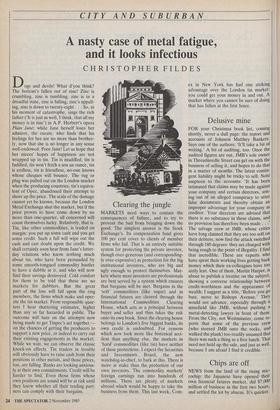Clearing the jungle
MARKETS need ways to contain the consequences of failure, and to try to prevent the bad from bringing down the good. The simplest answer is the Stock Exchange's. Its compensation fund gives 100 per cent cover to clients of member firms who fail. That is an entirely suitable system for protecting the private investor, though over-generous (and corresponding- ly over-expensive) as protection for the big institutional investors, who are big and ugly enough to protect themselves. Mar- kets where most investors are professionals are best served by a system which ensures that bargains will be met. Bargains in the `soft' commodities (like sugar) and in financial futures are cleared through the International Commodities Clearing House, which acts as a principal between buyer and seller and thus takes the risk onto its own book. Since the clearing house belongs to London's five biggest banks, its own credit is undoubted. For reasons which now look more like historical acci- dent than anything else, the markets in `hard' commodities (like tin) have neither of these protections. I expect the Securities and Investments Board, the new watchdog-in-chief, to bark at this. There is more at stake than the protection of our own investors. The commodity markets' foreign earnings run into hundreds of millions. There are plenty of markets abroad which would be happy to take the business from them. This last week, Corn- ex in New York has had one striking advantage over the London tin market: you could get your money in and out. A market where you cannot be sure of doing that has fallen at the first fence.






















































 Previous page
Previous page